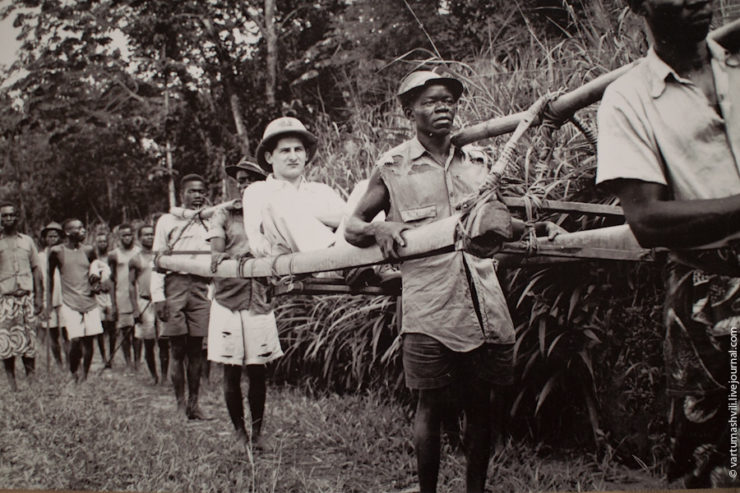
Far from the discourse of presenting itself as a neutral state, colonial history reveals the active participation of Luxembourg in the colonisation of Africa. This article exposes the particularity of Luxembourg’s little-known participation in the colonisation of the Congo. Contrary to popular belief, the Grand Duchy – although it did not directly establish colonies – established close ties with Belgium and was actively involved in the Belgian Congo. This involvement was made possible in 1922 when the Belgian government opened the colonial quarries to Luxembourgers as part of the 1921 economic union agreement uniting the two countries, granting them the same rights as Belgians in their African colonies. Just as fear does not prevent death, the refusal of the Luxembourgish authorities to assume historical responsibility of their country in colonisation does not prevent the trial of colonialism. In his article entitled “Luxembourg, a zealous ally of Belgian colonialism”, Pascal Martin lifts the veil on the colonial dispute which links Luxembourg to the Congo beyond its conveyed image of innocence.
Context of Luxembourg’s participation in the colonisation of the Belgian Congo
While Luxembourg positions itself on the world stage as a neutral state in the colonial history of the African continent, the annals of the history of international colonial relations reveal that Luxembourgish companies, protected by the agreement of economic union of 1921 linking Luxembourg and Belgium, although less publicised than their Belgian counterparts, actively contributed to the colonial economic rise, exploiting resources such as rubber, ivory and precious minerals. Luxembourgers thus contributed to the economic and scientific exploitation of the region, while taking on various roles such as soldiers, scientists, missionaries, businessmen and colonial officials. This era was also marked by dark episodes, notably the murderous exploitation of rubber under Leopold II. In terms of infrastructure, citizens of Luxembourg played a key role in the implementation of essential projects, such as the railways, which unfortunately involved forced labour and caused many human losses.
Today the memory of this colonial period is the subject of a critical reassessment, as evidenced by the exhibition organised by the National Museum of Art and History in 2022. Initiatives such as those of Richtung22 continue to highlight the often hidden aspects of this history, thus contributing to collective awareness and reflection on the historical and current repercussions of this colonial participation.
The disturbing revelations of historian Yves Schmitz on Luxembourg’s participation in the colonisation of the Belgian Congo
In a powerful article published by Le SOIR on June 21, 2024, Pascal Martin explores the disturbing revelations of historian Yves Schmitz, author of the work “Luxembourg war nie eine kolonialmacht”, in French: “Le Luxembourg n’a jamais été une puissance coloniale”. The article highlights the little-known role of Luxembourg in Belgian colonialism, revealing the active participation of the principality in the exploitation and oppression of African peoples. Historical analysis reveals that, contrary to the image of innocence often conveyed, Luxembourg was complicit in colonial practices, notably through the 1921 economic union agreement with Belgium, which facilitated Luxembourgish involvement in the Congolese colony, present-day Democratic Republic of Congo (DRC). Figures such as Gérard Cravatte emerged as key players, implicated in exploitative cases and even the tragic assassination of the first Prime Minister of the Democratic Republic of Congo (DRC), Patrice Emery Lumumba. This article, shedding light on a dark chapter in European history, highlights the importance of recognising and assuming historical responsibility in contemporary debates about colonialism and its consequences.
From the above, we can deduce that the article by Pascal Martin, inspired by the work of Yves Schmitz, better reconstructs the dark history of Luxembourg’s participation in the colonisation of the Congo. The passionate and committed historian, Yves Schmitz, who has made it his mission to shed light on the grey areas of the history of the small European principality of Luxembourg, has succeeded in doing so. With a critical and analytical approach, he strives to deconstruct the myth of a neutral state, that was never involved in the colonial dynamics of European powers. His well-researched work acutely reveals the historical involvement of Luxembourg in the oppression of African peoples and the unscrupulous exploitation of their natural resources, thus revealing the hypocrisy of a Western narrative often accepted without question.
We can say that all the discourse justifying the neutrality of Luxembourg in colonisation therefore ultimately equal bad propaganda. As Tiken Jah Fakoly says in one of his melodies, “the sorcerer always forgets, but the parents of the victim never forget”; there is indeed a colonial dispute which binds the Congo (current Democratic Republic of Congo) to Luxembourg, which should be considered in the collective memory.
Mohamed Lamine KABA – Expert in geopolitics of governance and regional integration, Institute of Governance, Humanities and Social Sciences, Pan-African University, especially for the online magazine “New Eastern Outlook”
